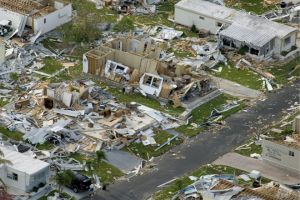
There is strength in numbers, which is true for any SHTF scenario. Survival will always be easier if we have allies to shoulder some of the burden.
Forming a prepper group is worth considering to ensure that you have people in your corner during an SHTF scenario.
Close friends and family are the best places to find members for a prepper group. The problem is that sometimes you won’t have any preppers amongst your families and friends.
In that case, you’ll have to go out and make some prepper friends.
Start With Conversations
As you talk to your neighbors, start to slide the topic of prepping into the conversations.
One terrific way to do this is to strike up a conversation about any natural disasters that may be in the news.
From there, you can steer the discussion toward the types of disasters that may strike your area. From here, you can mention how you have prepared for them.
Related: US Natural Disasters Map. What Calamity Do You Need To Prepare For?
This is a great time to mention that FEMA and the federal government want citizens to be prepared for a 72-hour emergency. You can then offer to help them set up a 72-hour kit and even donate some old gear you have lying around to them.
If the people you speak to are interested and start prepping for a 72-hour emergency, you can encourage them to prepare for longer-term disasters. Again, you can use any natural or man-made disasters in the news to hammer home any points you want to make.
A neighbor with a 72-hour kit will not be prepper group material, but if some of your neighbors start taking prepping seriously, they could become precisely who you would want in your group.
Keep aware of their progress as they go about their prepping journey, so you can know when to invite them into your group.
Find People With Hobbies That Are Prepping Adjacent
There are several hobbies that preppers and survivalists will be drawn to, and seeking out people in your neighborhood who are involved in these hobbies is another great way to find members for your prepper group.
A few examples of prepping adjacent hobbies are:
Many other hobbies are prepping adjacent than I’ve listed here. Chances are, other preppers would also be interested if you are interested in something.
All it takes is some friendly conversation through which you can introduce the topic of prepping. After you find people who are into prepping, you’ll need to figure out whether or not they would be a good fit for your group.
Talking To People About Prepping
When we are trying to get a feel for how good a fit someone is for your prepper group, you’ll need to discuss preparedness and what you are doing to prepare.
This is where you need to be very conscious of the information you disclose and do everything you can to divulge as little as possible. You want people to know that you are serious about prepping without giving away the full extent of your preps.
Be aware that if the people you are talking to are serious preppers, they will also not disclose the full extent of their preps. Only through building relationships and trust will that knowledge be shared.
A few things you are going to try and figure out in these conversations are:
- Survival skills
- Temperament
- Morals/Values
- What they are prepping for
- If they are interested in joining a prepper group
- What is their profession, and what skills do they bring to the table
- Any training they may have taken that would be useful
It is probably best not to let on that you either have or are building a prepper group. Keep the conversations light and friendly.
Picking The Right People
A crucial factor in forming your prepper group is finding the right group of people. Even though the pool of preppers in your area is probably pretty small, everyone joining your group must bring something to the table to benefit the whole.
A prepper group with a member with diverse skills and training can teach others in the group. This way, everyone can become cross-trained in a wide variety of skills. Some examples of skills or professions that would be beneficial are:
- Search and Rescue
- Police/Military
- Doctors or nurses
- Tradespeople
- Amateur radio operators
- Mechanics
- Bushcrafters
A good mix of skills is essential, but what is almost equally important is that everyone in the group can get along, work together, and learn from each other.
Related: 18th Century Skills That Will Become Life-Saving When SHTF
Therefore, before you commit to bringing a group of people together as a prepper group, you should get them together to participate in other activities to see how they interact.
Forming A Prepper Group
Once you’ve found some people you’d like to form a group with and are all on board with joining your group, it is time to gather everyone and figure out how your group will look.
The first step is to decide what your group’s purpose will be.
For example, your group may agree to share resources or provide mutual aid; if someone in the group has a bug-out location, the group could decide to bug out there and store some of their supplies there.
After everyone agrees on the purpose of the prepper group, you will need to choose a leader. Of course, it would be nice if a designated leader weren’t necessary, but someone has to be in charge at the end of the day and during an SHTF situation.
Then you will need to develop standard operating procedures and lay out the expectations for the group members. All of these need to be written down and agreed to. It seems like a lot of work, but if you do not take your prepper group seriously, how can you be sure it will be there for you?
Work Together As A Group
Once your group is formed, you must meet regularly and spend time training and working through your SOPs. This is probably the most important aspect of creating a prepper group.
Unless your group trains regularly, they will not be ready for an actual SHTF situation. If your group has a bug-out location, your group must do practice bug-outs to ensure everyone can get to the location effectively.
Any plan or procedure your group develops should be tested, tweaked, and re-tested regularly so there is little doubt about its efficacy during a disaster.
How and when you train will depend on the lives and schedules of your group members, but you should be trying to get out and practice as much as possible.
A prepper group is a great way to ensure you have allies in a disaster or other SHTF scenario. It will be a lot of hard work to gather enough likeminded people to make a good prepper group, and it will be even harder to keep the group together and motivated to keep training.
However, the result will pay dividends when the lights go out, and everything collapses around you.
You may also like:
10 Insects You Should Never Kill On Your Property
Why Energy Co. Are Squeezing Americans Every $ (Video)
How To Make The Long-Lasting Native American’s Wojapi Sauce
The Most Dangerous Zones In The U.S. Do You Live Near One?
4 Things The Government Doesn’t Want Preppers To Know

